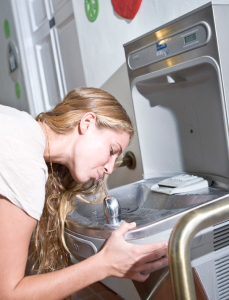 Scripps College has taken a stand against plastic waste. The College is investing in sustainability measures across the campus, including installing Elkay EZH2O bottle-filling stations. The first was installed in July 2010, in Toll Hall’s entryway; Scripps is the first of The Claremont Colleges to employ such stations. Currently installed in Routt, Clark, and Toll residence halls, the bottle-filling stations can be used to refill water containers, so that plastic waste is eliminated.
Scripps College has taken a stand against plastic waste. The College is investing in sustainability measures across the campus, including installing Elkay EZH2O bottle-filling stations. The first was installed in July 2010, in Toll Hall’s entryway; Scripps is the first of The Claremont Colleges to employ such stations. Currently installed in Routt, Clark, and Toll residence halls, the bottle-filling stations can be used to refill water containers, so that plastic waste is eliminated.
The new water stations have a fill rate that is three times that of a standard drinking fountain, filling a bottle in about six seconds. The stations also include a “Green Ticker,” which counts how many bottles are not ending up in landfills. The Toll Hall entryway station alone has saved more than 34,000 bottles in little more than a year.
The following statistics are startling: In just a year, Americans spend over $15 billion on bottled water. Every year, some 50 billion plastic water bottles end up in landfills, and about 1.5 million tons of plastic are used to bottle 89 billion liters of water, according to the organization Back2Tap. In 2007, a blogger for TreeHugger.com estimated that the oil used to make plastic bottles would be enough to run 100,000 cars for an entire year, in addition to fossil fuels burned to transport the bottles.
Scripps College plans to install more bottle-filling stations campus-wide, with a goal to eventually replace every drinking fountain with an EZH2O station. The College continues to research new ways to “go green,” by expanding its recycling programs, analyzing water usage to increase conservation, and composting its food scraps.
Sustainability efforts at Scripps are led by: the President’s Advisory Council on Sustainability, co-chaired by Lola Trafecanty, director of grounds, and Claire Bridge, assistant to the president; Niel Errickson, director of facilities; and Tom Adkins, director of dining services. For more information about sustainability at Scripps, contact Trafecanty at (909) 621-8381.

